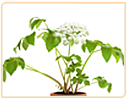Dong Quai Side Effects
 Like most herbal remedies, Dong quai usage comes with a full set of precautions and possible side effects. It is important that people considering using Dong quai are aware of the potential outcomes, side effects, warnings, and risks beforehand. Most importantly, it is advisable to have a consultation with a health care provider or pharmacist to discuss if Dong quai is the most appropriate treatment for the specific illness. Like most herbal remedies, Dong quai usage comes with a full set of precautions and possible side effects. It is important that people considering using Dong quai are aware of the potential outcomes, side effects, warnings, and risks beforehand. Most importantly, it is advisable to have a consultation with a health care provider or pharmacist to discuss if Dong quai is the most appropriate treatment for the specific illness.
It is worth noting that most of Dong quai�s side effects are not fully proven but merely suggested. More research needs to be done into its effects on the human body, both positive and negative. Continue reading to find out about the precautionary warnings associated with this herb.
Warnings - Breast Cancer / Drug Interactions
 The risk of breast cancer may increase with the use of Dong quai. Cancer patients should talk to their doctors prior to use. The risk of breast cancer may increase with the use of Dong quai. Cancer patients should talk to their doctors prior to use.
Dong quai should not be combined with pharmaceutical drugs or other herbs and dietary supplements.
It has yet to be proven whether or not the herb interferes with the effects of oral contraceptives or hormone replacement therapy.
Due to anticoagulant (blood thinning) properties, Dong quai may increase the risk of bleeding and should not be used at the same time as other blood thinning drugs including aspirin, warfarin (Coumadin) or heparin. Similarly, do not use Dong quai if taking anti-platelet drugs such as clopidogrel (Plavix), and non-steroidal anti-inflammatory drugs such as ibuprofen (Motrin, Advil) or naproxen (Naprosyn, Aleve).
Dong Quai Side Effects
 Dong quai has been known to increase the photosensitivity of the skin, so those taking the herb should stay out of the sun and protect themselves with sunscreen. Dong quai should be avoided when taking other drugs that cause photosensitivity, such as tretinoin (Retin-A, Renova). Do not mix Dong quai with some types of antibiotics, anti-depressants, cancer drugs or anti-psychotic medications. Dong quai has been known to increase the photosensitivity of the skin, so those taking the herb should stay out of the sun and protect themselves with sunscreen. Dong quai should be avoided when taking other drugs that cause photosensitivity, such as tretinoin (Retin-A, Renova). Do not mix Dong quai with some types of antibiotics, anti-depressants, cancer drugs or anti-psychotic medications.
This herb has a mild laxative effect and prolonged use may cause diarrhea, nausea, upset stomach, vomiting, loss of appetite, bloating or burping.
Dong quai should not be taken with herbs or supplements that may increase the risk of bleeding including Ginkgo biloba, garlic, and Saw palmetto. When combined with other herbs, Dong quai is known to cause headache, sedation or drowsiness, dizziness, irritability, insomnia, sweating, fever, weakness, increased male breast size, kidney problems or skin rash.
 The use of Dong quai for pregnant or nursing women is discouraged due to possible hormonal or anticoagulant properties. Dong quai may also increase the risk of natural abortion or miscarriage. Children should not take this herb as its side effects for children are relatively uncertain. The use of Dong quai for pregnant or nursing women is discouraged due to possible hormonal or anticoagulant properties. Dong quai may also increase the risk of natural abortion or miscarriage. Children should not take this herb as its side effects for children are relatively uncertain.
Despite its side effects, Dong quai is used to help menopausal women. Read the next section to find out more about Dong quai and menopause.
Dong Quai Substitutes
Dong quai is believed to be an estrogenic herb that mimics the properties of estrogen. Because of this, it may cause unwanted side effects and increase the risk of cancer.
There are other natural methods that do not contain estrogen and which do not produce side effects. These are called non-estrogenic herbs and they are commonly used during menopause to encourage the body�s own production of hormones. Non-estrogenic herbs are believed to possess nutrients that can stimulate the endocrine system (hormone-producing system) into maintaining healthy hormone levels. Read more about non-estrogenic remedies in the following article.
Which herb should women try? Today women are looking for relief from their menopause symptoms with herbs. Phytoestrogenic herbs and non-estrogenic herbs are good in relieving menopause symptoms, but recent studies show that non-estrogenic herbs have no side effects because they help the body to produce its own hormones instead of introducing hormones like the phytoestrogenic ones. Learn more about non-estrogenic herbs for menopause.
| 

